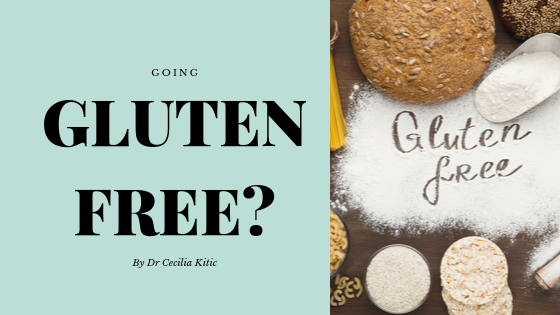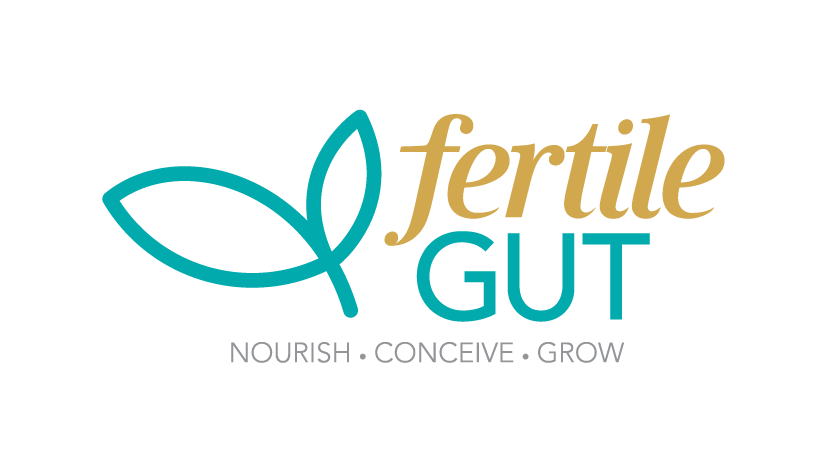|
I hear of so many people removing gluten from their diet in a bid to improve their fertility and get pregnant. There is a lot of misinformation out there so here is a wrap of gluten and fertility to get informed about the decisions you make! What is Gluten? Gluten is essentially the ‘glue’ that holds cereal grains together. It is a protein found in wheat, rye, barley, oats and anything derived from these gluten containing grains such as malt. Gluten is a common additive to many foods (sometimes as a thickener or colour) so you may find it in ice cream, lollies, processed meats, yoghurt and salad dressings. For those diagnosed with Coeliac Disease, eating gluten disrupts the gastrointestinal tract and damages intestinal cells, stressing the immune system and reducing the absorption of nutrients. Untreated Coeliac Disease is a cause of ‘unexplained’ infertility but the number of women with undiagnosed Coeliac Disease is low. In a recent Canadian study, only 1.2% of women with unexplained infertility were diagnosed with Coeliac Disease following routine screening (1). If you are a Coeliac then removing gluten from your diet will improve your fertility. If you are not a Coeliac, there is no scientific evidence to support that eating gluten free will improve your chance of pregnancy. It can be exhausting reading food labels to determine if a product is gluten free but for anyone diagnosed with Coeliac Disease, a strict gluten free diet is the only management strategy we currently have. There is hope that hookworms may help but expect any alternative treatment to be at least a decade away. As a Coeliac myself I am hopeful that one day I can eat some gluten containing goodies! Is it Gluten or FODMAPS? Some people who are not diagnosed with Coeliac Disease experience symptoms such as abdominal pain, diarrhoea, bloating and excessive wind and fatigue that they attribute to eating gluten or wheat. This has been termed ‘Non-Coeliac Gluten Sensitivity’ and emerging research in this field suggests that it is not gluten that contributes to these symptoms but rather the FODMAP content of the diet (2). FODMAPs are short chain carbohydrates that may be poorly absorbed in the gastrointestinal tract. FODMAPs include fructose (when in excess of glucose), fructans, galacto-oligosaccharides, lactose and polyols (eg. sorbitol and mannitol) – hence the acronym! Some of our work in healthy athletes has shown that reducing dietary FODMAPs can reduce gastrointestinal symptoms (3) so it may not be gluten that is the culprit if you are experiencing gastrointestinal distress. If you think you need to remove gluten from your diet make sure you find the cause of your symptoms with a proper medical diagnosis prior to gluten removal. Is Eating Gluten Free Healthier? Somehow ‘gluten free’ has become synonymous with ‘healthy’, but is eating gluten free actually healthier? If processed foods are removed from your diet and you eat more whole foods when eating gluten free, then generally this will be associated with a reduction in dietary intake of sugars and saturated fats (including trans fats) which would be beneficial to health and fertility. But, there may be some other dietary changes associated with removing gluten that are not so great for health, especially if you reduce your intake of grains. Removing gluten from your diet by cutting out bread, pasta and cereal may significantly reduce your dietary intake of fibre (which has neagtive consequences for creating a Fertile Friendly Microbiota) and carbohydrate. Carbohydrates are a really important component of a balanced, healthy diet and importantly wholegrain intake has been associated with improved outcomes for fertility treatment (4). Gluten containing grains are often substituted for carbohydrate rich but protein poor ingredients such as maize starch, white rice flour, potato starch or tapioca starch in gluten free alternatives. This means that your protein intake could be reduced, which may impair fertility. A study that investigated the nutritional value of over 3000 gluten free and non-gluten products in 10 categories of food showed that relative to non-gluten free foods, gluten free products had consistently lower average protein content (5). When you consider that gluten free products often substitute ingredients with low fibre and protein alternatives, and that gluten free products may contain more sugar and fat to improve taste, eating gluten free is not necessarily a healthier option. Does Gluten Influence Thyroid Function? There is a partial genetic overlap between Coeliac Disease and autoimmune diseases. If you have Coeliac Disease, you are four times more likely to have an autoimmune thyroid disease. If you have been diagnosed with hypothyroidism you should immediately undergo clinical investigations for Coeliac Disease. A first step in this process is screening for blood levels of antibodies to gluten. If you have removed gluten from your diet before any investigations you will need to start eating gluten again for a period greater than one month so you can receive an accurate diagnosis. While there is a link between Coeliac Disease and an increased prevalence of autoimmune thyroid disease, there is no evidence to support a link between eating gluten and an increased risk of thyroid issues. Indeed, even in people with Coeliac Disease that is undiagnosed, the duration of exposure to gluten is unrelated to the risk for autoimmune disease. To date, there is no scientific evidence to support removing gluten from the diet as a treatment strategy for thyroid disorders (unless of course you are a Coeliac). Hypothyroidism and Coeliac Disease are associated with reductions in egg quality and infertility (6,7) so getting a proper diagnosis is paramount. While removing gluten may not be the answer, diet can influence thyroid function and resulting metabolism. Dietary protein intake has been linked to thyroid function in a number of animal studies, with low protein diets reducing thyroid function, increasing abdominal obesity and impairing glucose regulation (8). Ensuring adequate protein in the diet has potential to improve thyroid function and adequate protein intake is essential for muscle building too. Some foods such as broccoli, cabbage, cauliflower, brussel sprouts, turnips, walnuts, almonds and soy may limit iodine availability, although this is only if consumed in large amounts. Cooked cruciferous vegetables in moderate amounts pose minimal risk for thyroid health (9) and given the other micronutrients they contain, their intake along with adequate iodine will form part of a balanced diet. What's Your Gut Feeling? The immune stimulating potential of gluten may be related to your gut microbiota. The HLA-DQ9 gene is the most commonly linked to Coeliac Disease yet some people carrying the gene do not have Coeliac Disease. Could the resident bacteria in your gut influence your propensity to develop Coeliac Disease or Non-Coeliac Gluten Sensitivity?
A study using mice looked at the impact of the gut microbiome on the response to gluten (10). Three groups of mice with three different microbiomes (different populations of bacteria and yeast in the gut) were exposed to gluten for two weeks. Mice with no microbiome (germ free) and mice with a microbiome that contained a number of disease causing species developed an adverse response to gluten, while mice with a healthy microbiome (free of disease causing pathogens) did not have an adverse response. There may be value in ensuring your microbiome is in top shape! Historically, a gluten free diet has been associated with sub-optimal intake of protein, fiber, B vitamins, and iron alongside increased fat and sugar intake (11). In combination with possible micronutrient deficiency, removing gluten may have other adverse consequences. In healthy adults adhering to a gluten free diet for one month, numbers of healthy gut bacteria decreased while numbers of unhealthy bacteria increased. Rather than removing gluten from your diet, if not medically necessary, a focus on pre-biotic foods and eating a variety of fresh whole foods is sure to confer more benefit. Are you getting enough prebiotic foods in your day? References 1. Gunn, B., Murphy, K.E., andGreenblatt, E.M. (2017). Unexplained Infertility and Undiagnosed Celiac Disease: Study of a Multiethnic Canadian Population. J Obstet Gynaecol Can. 2. Biesiekierski, J.R., Peters, S.L., Newnham, E.D., Rosella, O., Muir, J.G., andGibson, P.R. (2013). No effects of gluten in patients with self-reported non-celiac gluten sensitivity after dietary reduction of fermentable, poorly absorbed, short-chain carbohydrates. Gastroenterology 145(2): 320-8 e1-3. 3. Lis, D.M., Stellingwerff, T., Kitic, C.M., Fell, J.W., and Ahuja, K.D.K. (2018). Low FODMAP: A Preliminary Strategy to Reduce Gastrointestinal Distress in Athletes. Med Sci Sports Exerc 50(1): 116-123. 4. Gaskins, A.J., Chiu, Y.H., Williams, P.L., Keller, M.G., Toth, T.L., Hauser, R., Chavarro, J.E., andTeam, E.S. (2016). Maternal whole grain intake and outcomes of in vitro fertilization. Fertil Steril 105(6): 1503-1510 e4. 5. Wu, J.H., Neal, B., Trevena, H., Crino, M., Stuart-Smith, W., Faulkner-Hogg, K., Yu Louie, J.C., andDunford, E. (2015). Are gluten-free foods healthier than non-gluten-free foods? An evaluation of supermarket products in Australia. Br J Nutr 114(3): 448-54. 6. Meng, L., Rijntjes, E., Swarts, H., Bunschoten, A., van der Stelt, I., Keijer, J., andTeerds, K. (2016). Dietary-Induced Chronic Hypothyroidism Negatively Affects Rat Follicular Development and Ovulation Rate and Is Associated with Oxidative Stress. Biol Reprod 94(4): 90. 7. Tersigni, C., Castellani, R., de Waure, C., Fattorossi, A., De Spirito, M., Gasbarrini, A., Scambia, G., andDi Simone, N. (2014). Celiac disease and reproductive disorders: meta-analysis of epidemiologic associations and potential pathogenic mechanisms. Hum Reprod Update 20(4): 582-93. 8. Palkowska-Gozdzik, E., Lachowicz, K., andRosolowska-Huszcz, D. (2017). Effects of Dietary Protein on Thyroid Axis Activity. Nutrients 10(1). 9. Felker, P., Bunch, R., andLeung, A.M. (2016). Concentrations of thiocyanate and goitrin in human plasma, their precursor concentrations in brassica vegetables, and associated potential risk for hypothyroidism. Nutr Rev 74(4): 248-58. 10. Caminero, A., Galipeau, H.J., McCarville, J.L., Johnston, C.W., Bernier, S.P., Russell, A.K., Jury, J., Herran, A.R., Casqueiro, J., Tye-Din, J.A., Surette, M.G., Magarvey, N.A., Schuppan, D., andVerdu, E.F. (2016). Duodenal Bacteria From Patients With Celiac Disease and Healthy Subjects Distinctly Affect Gluten Breakdown and Immunogenicity. Gastroenterology 151(4): 670-83. 11. Theethira, T.G., Dennis, M., andLeffler, D.A. (2014). Nutritional consequences of celiac disease and the gluten-free diet. Expert Rev Gastroenterol Hepatol 8(2): 123-9. Comments are closed.
|
|
1300 084 694
[email protected] Suite T36, 477 Boundary St Spring Hill, Brisbane QLD 4000 Fax. 07 3540 8164 Copyright © 2022
|



